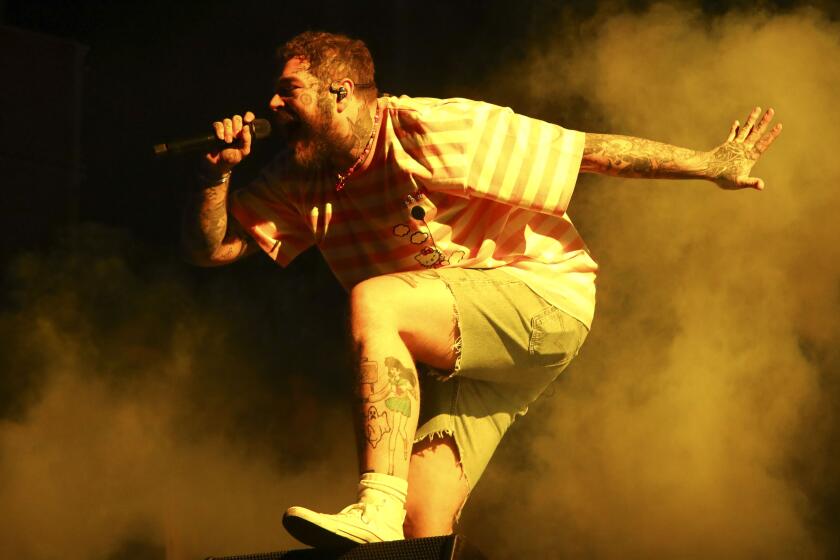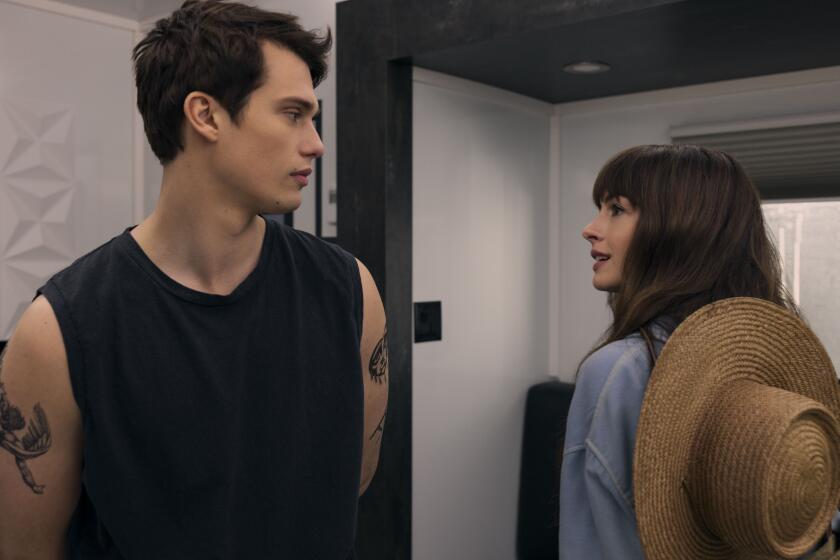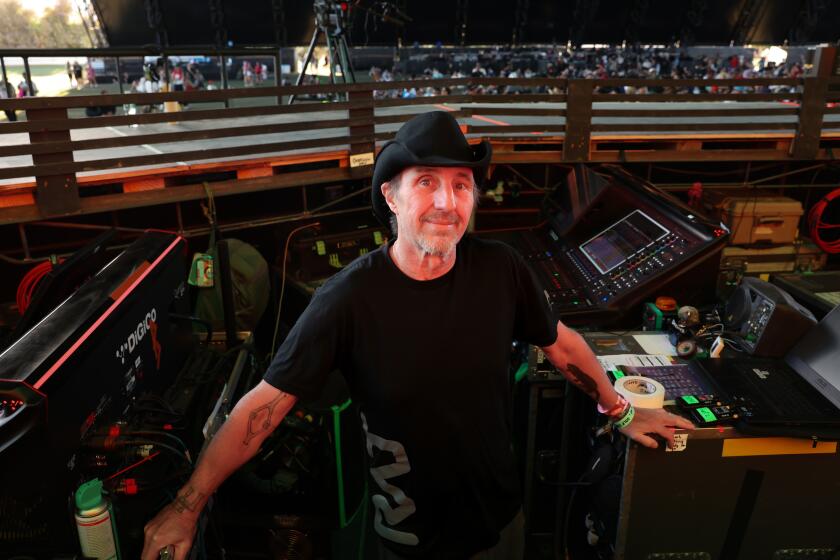The Neighbourhood on identity, Coachella and bouncing back from bad reviews
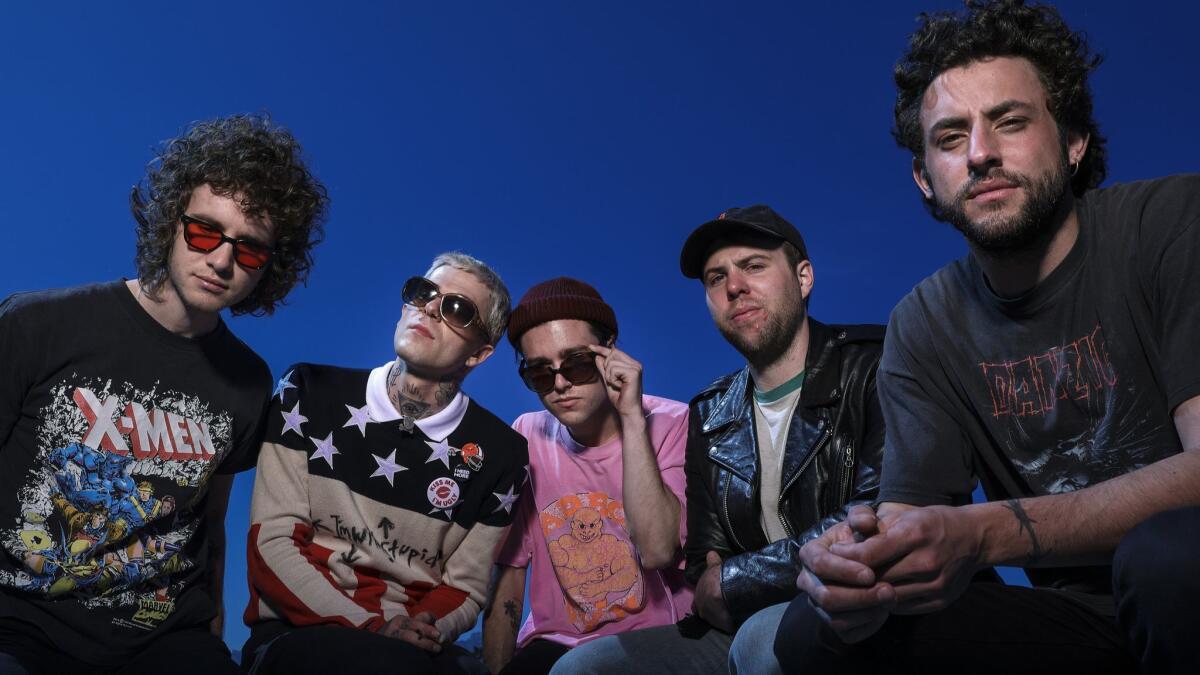
L.A. pop band the Neighbourhood doesn’t like to be pinned down.
“If you just looked up where we were from and you looked at what we looked like, it’d be very easy to assume a lot of things about us,” said lead singer Jesse Rutherford over lunch in West Hollywood. “Some of those things might even be true. But I don’t think we agree with a lot of the boxes that we’ve been put in.”
Or a lack of them.
The genre-crossing rock outfit, signed to Sony’s Columbia Records, has been accused of struggling to find an identity: Following the success of the moody rock of KROQ-FM staple “Sweater Weather,” the act began to more aggressively experiment with digital textures and Rutherford in his own work has dabbled with R&B. But for the five members — who range in age from 24 to 27 and will appear at the Coachella Valley Music and Arts Festival this weekend — trying on different identities is just a part of growing up.
“Like it or hate it, at least we’re going for stuff and trying and being ambitious,” said guitarist Zachary Abels.
“We are ever-changing,” chimed in drummer Brandon Fried. “And we’re growing up and figuring it out.”
That dynamism was alluded to within the band’s recent spate of releases: two five-song EPs followed by a self-titled third studio album with another EP, “Ever Changing,” on the way. Combine the names of all four works, and one gets “Hard to Imagine the Neighbourhood Ever Changing.”
“We wanted to build a sentence and then ‘The Neighbourhood’ landed on the album,” Fried explained.
“We didn’t once debate that this album should be self-titled,” said bassist Michael Margott of the newest release. “This record is something that we felt really comfortable all being a part of together.”
The recent works skew more experimental and electronic than the band’s atmospheric pop of yore, though Rutherford’s melodic, R&B-inflected vocals remain the same. “Hard,” the first of the staggered releases, came out last September and was followed by “To Imagine” in January. “The Neighbourhood” was issued last month and combines some of the songs from the prior EPs with new additions.
“With how music is evolving in this day and age, with the internet and streaming platforms, everything moves so fast,” Rutherford explained. “So we needed to figure out a way to sustain the next product that we put out for a while.”
Nowadays, buzz doesn’t last long for artists who release just 10 to 12 new tracks after being on hiatus for years, Rutherford said.
“In the first month people are excited about it, but then it fizzles out and nothing happens. And it’s hurting people who do this for a living. So we just needed to figure out a way to ...”
“Stay relevant,” interjected guitarist Jeremy Freedman. “Keep people’s attention.”
“And kind of adapt with the times,” Rutherford finished.
“With trying to adapt, we also created an idea that would be our own,” Margott said of the release strategy. “There are no bands that are doing [this] right now and I think that was part of the draw to it. Not only to adapt to the times, but also to stand out. I think that was really important to all of us.”
Following the record’s release, Pitchfork published a blistering takedown of not only the album but the band itself.
“I woke up to an email that was basically like, ‘Hey, you guys got reviewed on Pitchfork. Gave you a 4.7. Jesse, don’t read it.’” Rutherford recalled.
Near the end of the critique, the reviewer, arguing that the band’s mix of styles added up to little, questioned, “Who do these guys think they are?”
“It kind of got me thinking like, maybe we don’t [know who we are] but that’s also part of what we do,” Rutherford said. “I don’t think I can quite say everything about who I am, but I know what I’m not. And that’s the most important to me.
“I don’t think a lot of people know themselves. But we’re doing something different. I don’t care what anybody says, we’re doing something different right now and that’s crazy enough to me.”
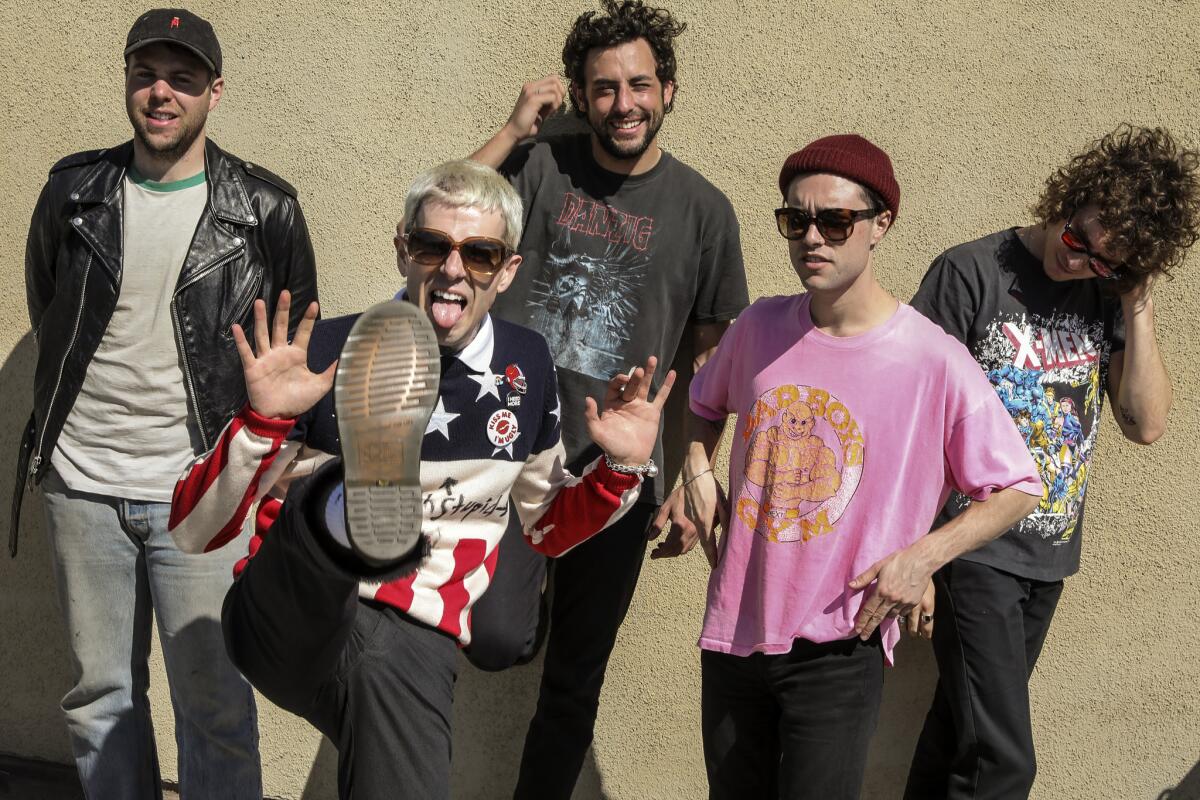
At the time of the interview, the band was deep into rehearsals for its performances at Coachella, where it’s scheduled to appear on Friday.
“We started this band because of Coachella,” admitted Rutherford. After making it out to Indio one year, the guys were inspired by the post-festival scenery and mix of bands onstage.
“We were just like, ‘We gotta do this,’” he said. “And then a year or two later we were there.”
“The first time we played [in 2013] it was still a rock/indie festival,” said Abels. “It was the Stone Roses, Phoenix and [Red Hot Chili Peppers] headlining. So just three super rock bands compared to this year being the Weeknd, Beyoncé and Eminem.”
“I’m stoked,” said Rutherford.
“I’m excited,” agreed Abels. “But it’s a night and day difference.”
Though it is often categorized as a pop act, the band draws heavy influence from hip-hop and pop.
“I like pop music and I’m personally most attracted to that,” said Rutherford. “My mom listened to classic rock radio a lot so I heard the Eagles and I just confirmed that I hated them early on.”
Rutherford cites pop band ’N Sync and its breakout star Justin Timberlake as early influences. “And then once hip-hop entered my view it was like, ‘Oh, OK, well that’s what this is.”
“I’d say generally for all of us, where we find common ground is we’re really big fans of pop music,” said Abels. “I think that’s where we come together as a band.”
“I think that the change might be favorable toward us,” Fried said. “Instead of a rock/indie fest, we’re probably better off playing a pop/hip-hop festival.”
As to whether they’re worried that the Coachella crowd will misinterpret them, Rutherford remained optimistic.
“If anything, music is now ready for us,” he said. “Now more than ever it’s like, we make more sense than we ever ... had before.”
follow me on twitter @sonaiyak
More to Read
The biggest entertainment stories
Get our big stories about Hollywood, film, television, music, arts, culture and more right in your inbox as soon as they publish.
You may occasionally receive promotional content from the Los Angeles Times.




